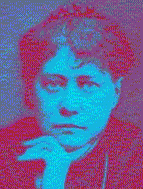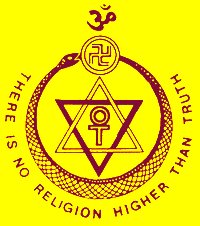The Key to Theosophy

Helena
Petrovna Blavatsky
1831
-1891
_______________________
The Key to Theosophy
By
Helena Petrovna Blavatsky
On the Mysteries of Reincarnation
Periodical Rebirths
Q. You mean, then, that we have all lived on earth before, in many
past
incarnations, and shall
go on so living?
A. I do. The life cycle, or rather the cycle of conscious life,
begins with the
separation of the
mortal animal-man into sexes, and will end with the close of
the last
generation of men, in the seventh round and seventh race of mankind.
Considering we are only in the fourth round and fifth race, its
duration is more
easily imagined
than expressed.
Q. And we keep on incarnating in new personalities all the time?
A. Most assuredly so; because this life cycle or period of
incarnation may be
best compared to
human life. As each such life is composed of days of activity
separated by nights of
sleep or of inaction, so, in the incarnation cycle, an
active life is
followed by a Devachanic rest.
Q. And it is this succession of births that is generally defined as
reincarnation?
A. Just so. It is only through these births that the perpetual
progress of the
countless millions of
Egos toward final perfection and final rest (as long as
was the period
of activity) can be achieved.
Q. And what is it that regulates the duration, or special qualities
of these
incarnations?
A. Karma, the universal law of retributive justice.
Q. Is it an intelligent law?
A. For the Materialist, who calls the law of periodicity which
regulates the
marshaling of the
several bodies, and all the other laws in nature, blind forces
and mechanical
laws, no doubt Karma would be a law of chance and no more. For us, no adjective
or qualification could describe that which is impersonal and no entity, but a
universal operative law. If you question me about the causative
intelligence in it, I
must answer you I do not know. But if you ask me to define
its effects and
tell you what these are in our belief, I may say that the
experience of thousands
of ages has shown us that they are absolute and unerring equity, wisdom, and intelligence.For Karma in its effects is an unfailing
redresser of human
injustice, and of all the failures of nature; a stern
adjuster of wrongs; a
retributive law which rewards and punishes with equal
impartiality. It is, in
the strictest sense, "no respecter of persons," though,
on the other
hand, it can neither be propitiated, nor turned aside by prayer.
This is a belief common to Hindus and Buddhists, who both believe
in Karma.
Q. In this Christian dogmas contradict both, and I doubt whether
any Christian
will accept the
teaching.
A. No; and Inman gave the reason for it many years ago. As he puts
it, while
… the Christians will accept any nonsense,
if promulgated by the Church as a
matter of faith …
the Buddhists hold that nothing which is contradicted by sound reason can be a
true doctrine of Buddha.
They do not believe in any pardon for their sins, except after an
adequate and
just punishment
for each evil deed or thought in a future incarnation, and a
proportionate compensation
to the parties injured.
Q. Where is it so stated?
A. In most of their sacred works. Consider the following
Theosophical tenet:
Buddhists believe that every act, word, or thought has its
consequence, which
will appear
sooner or later in the present or in the future state. Evil acts
will produce evil
consequences, good acts will produce good consequences:
prosperity in this
world, or birth in heaven (Devachan) … in the future state.
Q. Christians believe the same thing, don't they?
A. Oh, no; they believe in the pardon and the remission of all
sins. They are
promised that if they
only believe in the blood of Christ (an innocentvictim!),
in the blood
offered by Him for the expiation of the sins of the whole of
mankind, it will
atone for every mortal sin. And we believe neither in vicarious
atonement, nor in the
possibility of the remission of the smallest sin by any
god, not even by
a "personal Absolute" or "Infinite," if such a thing could
have
any existence.
What we believe in, is strict and impartial justice. Our idea of
the unknown
Universal Deity, represented by Karma, is that it is a Power which
cannot fail, and
can, therefore, have neither wrath nor mercy, only absolute
Equity, which leaves every cause, great or small, to work out its
inevitable
effects. The saying
of Jesus: "With what measure you mete it shall be measured
to you
again," neither by expression nor implication points to any hope of
future mercy or
salvation by proxy. This is why, recognizing as we do in our
philosophy the justice
of this statement, we cannot recommend too strongly
mercy, charity,
and forgiveness of mutual offenses. Resist not evil,
and render
good for evil,
are Buddhist precepts, and were first preached in view of the
implacability of Karmic
law. For man to take the law into his own hands is
anyhow a
sacrilegious presumption. Human Law may use restrictive not punitive
measures; but a man
who, believing in Karma, still revenges himself and refuses
to forgive
every injury, thereby rendering good for evil, is a criminal and only
hurts himself. As
Karma is sure to punish the man who wronged him, by seeking to inflict an
additional punishment on his enemy, he, who instead of leaving that
punishment to the great
Law adds to it his own mite, only begets thereby a cause
for the future
reward of his own enemy and a future punishment for himself. The
unfailing Regulator
affects in each incarnation the quality of its successor;
and the sum of
the merit or demerit in preceding ones determines it.
Q. Are we then to infer a man's past from his present?
A. Only so far as to believe that his present life is what it
justly should be,
to atone for
the sins of the past life. Of course-seers and great adepts
excepted-we cannot as
average mortals know what those sins were. From our
paucity of data, it
is impossible for us even to determine what an old man's
youth must have
been; neither can we, for like reasons, draw final conclusions
merely from what we
see in the life of some man, as to what his past life may
have been.
__________________________

Find answers to more questions
with
these Theosophy links
Dave’s
Streetwise Theosophy Boards
The Theosophy Website that
Welcomes Absolute Beginners
If you run a Theosophy Study Group,
please feel free
to make use of the
material on this Website
The Most Basic Theosophy
Website in the Universe
A quick overview of Theosophy
and the Theosophical Society
If you run a Theosophy Study Group you
can use this as an introductory handout.

Cardiff Theosophical Society meetings
are informal
and there’s always a cup of tea afterwards
The
Cardiff Theosophical Society Website
The
National Wales Theosophy Website
This is for
everybody not just people in Wales
Theosophy Cardiff’s Instant Guide
General pages
about Wales, Welsh History
and The History of
Theosophy in Wales
Independent Theosophy Blog
One liners and quick explanations
About aspects of Theosophy
H P Blavatsky is usually the only
Theosophist that most people have
ever
heard of. Let’s put
that right
Lentil burgers, a
thousand press ups before breakfast and
the daily 25 mile
run may put it off for a while but death
seems to get most of
us in the end. We are pleased to
present for your
consideration, a definitive work on the
subject by a Student of
Katherine Tingley entitled
An
Independent Theosophical Republic
Links to Free Online Theosophy
Study Resources; Courses, Writings,
No
Aardvarks were harmed in the
The Spiritual Home of Urban Theosophy
The Earth Base for Evolutionary Theosophy
Classic Introductory
Theosophy Text
A Text Book of Theosophy By C
What Theosophy Is From the Absolute to Man
The Formation of a Solar System The Evolution of Life
The Constitution of Man After Death Reincarnation
The Purpose of Life The Planetary Chains
The Result of Theosophical Study
An Outstanding
Introduction to Theosophy
By a student of
Katherine Tingley
Elementary Theosophy Who is the Man? Body and Soul
Body, Soul and Spirit Reincarnation Karma
Preface
Theosophy and the Masters General Principles
The Earth Chain Body and Astral Body Kama – Desire
Manas Of
Reincarnation Reincarnation Continued
Karma Kama Loka
Devachan
Cycles
Arguments Supporting Reincarnation
Differentiation Of Species Missing Links
Psychic Laws, Forces, and Phenomena
Psychic Phenomena and Spiritualism
Quick Explanations with Links to More
Detailed Info
What is Theosophy ? Theosophy Defined (More Detail)
Three Fundamental Propositions Key Concepts of Theosophy
Cosmogenesis
Anthropogenesis
Root Races
Karma
Ascended Masters After Death States
Reincarnation
The Seven Principles of Man Helena Petrovna Blavatsky
Colonel Henry Steel Olcott William Quan Judge
The Start of the Theosophical Society Theosophical Society Presidents
History of the Theosophical Society Glossaries of Theosophical Terms
History of the Theosophical Society in Wales
The Three Objectives of the Theosophical Society
Explanation of the Theosophical Society Emblem
Karma Fundamental Principles Laws: Natural and Man-Made The Law of Laws
The Eternal Now
Succession
Causation The Laws of Nature A Lesson of The Law
Karma Does Not Crush Apply This Law
Man in The Three Worlds Understand The Truth
Man and His Surroundings The Three Fates The Pair of Triplets Thought, The Builder
Practical Meditation Will and Desire
The Mastery of Desire Two Other Points
The Third Thread Perfect Justice
Our Environment
Our Kith and Kin Our Nation
The Light for a Good Man Knowledge of Law The Opposing Schools
The More Modern View Self-Examination Out of the Past
Old Friendships
We Grow By Giving Collective Karma Family Karma
National Karma
India’s Karma
National Disasters
Try these if you are looking
for a
local Theosophy Group or Centre
UK Listing of Theosophical Groups